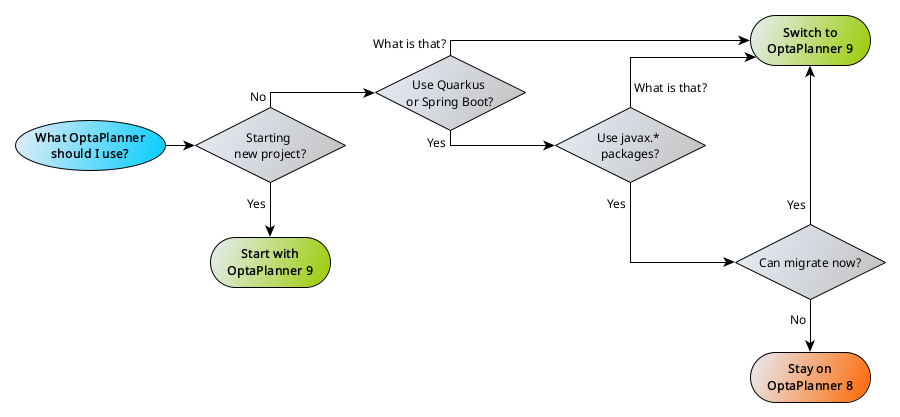<dependency>
<groupId>org.optaplanner</groupId>
<artifactId>optaplanner-core</artifactId>
<version>9.44.0.Final</version>
</dependency>Download
OptaPlanner 9 (latest)
Distribution zip
The OptaPlanner distribution zip includes binaries, documentation, examples and sources.
-
 Download OptaPlanner Engine 9.44.0.Final
Download OptaPlanner Engine 9.44.0.Final-
License: Apache License 2.0 - Date: Wed 6 September 2023
-
Download size: Large (over 90% is due to examples, data sets and documentation)
-
For Red Hat subscription releases go to the product download site.
Maven
The OptaPlanner jars are also available in the central maven repository (and also in the JBoss maven repository).
With Maven, just add the optaplanner-core dependency in your pom.xml to get started:
Or better yet, import the optaplanner-bom to avoid duplicating version numbers
when adding other optaplanner dependencies later on:
<project>
...
<dependencyManagement>
<dependencies>
<dependency>
<groupId>org.optaplanner</groupId>
<artifactId>optaplanner-bom</artifactId>
<type>pom</type>
<version>9.44.0.Final</version>
<scope>import</scope>
</dependency>
</dependencies>
</dependencyManagement>
<dependencies>
<dependency>
<groupId>org.optaplanner</groupId>
<artifactId>optaplanner-core</artifactId>
</dependency>
<dependency>
<groupId>org.optaplanner</groupId>
<artifactId>optaplanner-test</artifactId>
<scope>test</scope>
</dependency>
...
</dependencies>
</project>Gradle
With Gradle, just add the optaplanner-core dependency in your build.gradle to get started:
dependencies {
implementation 'org.optaplanner:optaplanner-core:9.44.0.Final'
}OptaPlanner 8 (legacy)
Both OptaPlanner 8 and 9 are equal feature-wise and their APIs have not changed. While OptaPlanner 9 brings compatibility with Jakarta EE 10, Quarkus 3 and Spring Boot 3, OptaPlanner 8 provides full backward compatibility for users who cannot migrate yet. OptaPlanner 8 will keep being released in parallel to OptaPlanner 9 until further notice.
If you are not sure which version to pick, see the following diagram:

To summarize what the diagram shows:
- If you're starting a new project, or you don't use Quarkus or Spring Boot, we recommend using OptaPlanner 9.
- Otherwise, stay on OptaPlanner 8, but plan for the migration. OptaPlanner 8 releases will end once enough users adopt Quarkus 3 or Spring Boot 3.
Distribution zip
The OptaPlanner distribution zip includes binaries, documentation, examples and sources.
-
 Download OptaPlanner Engine 8.44.0.Final
Download OptaPlanner Engine 8.44.0.Final-
License: Apache License 2.0 - Date: Wed 6 September 2023
-
Download size: Large (over 90% is due to examples, data sets and documentation)
-
For Red Hat subscription releases go to the product download site.
Maven
The OptaPlanner jars are also available in the central maven repository (and also in the JBoss maven repository).
With Maven, just add the optaplanner-core dependency in your pom.xml to get started:
<dependency>
<groupId>org.optaplanner</groupId>
<artifactId>optaplanner-core</artifactId>
<version>8.44.0.Final</version>
</dependency>Or better yet, import the optaplanner-bom to avoid duplicating version numbers
when adding other optaplanner dependencies later on:
<project>
...
<dependencyManagement>
<dependencies>
<dependency>
<groupId>org.optaplanner</groupId>
<artifactId>optaplanner-bom</artifactId>
<type>pom</type>
<version>8.44.0.Final</version>
<scope>import</scope>
</dependency>
</dependencies>
</dependencyManagement>
<dependencies>
<dependency>
<groupId>org.optaplanner</groupId>
<artifactId>optaplanner-core</artifactId>
</dependency>
<dependency>
<groupId>org.optaplanner</groupId>
<artifactId>optaplanner-test</artifactId>
<scope>test</scope>
</dependency>
...
</dependencies>
</project>Gradle
With Gradle, just add the optaplanner-core dependency in your build.gradle to get started:
dependencies {
implementation 'org.optaplanner:optaplanner-core:8.44.0.Final'
}Non-Final releases
Non-Final releases are the best way to test drive new features and APIs to provide feedback before we lock down the API with a Final release. We welcome such feedback in our forum.
Alphas, Betas and CRs
An Alpha can be unstable. A Beta should work (it passes automated testing), but its new APIs might still change in the next release. A CR should be almost identical to the Final release.
There is no Alpha or Beta yet because we just released a Final version.
Nightly snapshots
Nightly snapshots are unstable binaries, built automatically by our CI server.
Older releases
For older community releases, check the release archive.
-
Wed 6 September 2023
-
Thu 27 April 2023
Anna Dupliak
-
Mon 24 April 2023
Radovan Synek
-
Tue 21 February 2023
Lukáš Petrovický
-
Tue 15 November 2022
Geoffrey De Smet
-
Wed 9 November 2022
Radovan Synek
-
Tue 6 September 2022
Geoffrey De Smet
-
Thu 9 June 2022
Radovan Synek
-
The Vehicle Routing Problem
Fri 23 September 2022
Geoffrey De Smet
-
Introduction to OptaPlanner AI constraint solver
Thu 25 August 2022
Anna Dupliak
-
On schedule: Artificial Intelligence plans that meet expectations
Sat 23 July 2022
Geoffrey De Smet
-
Host your OptaPlanner app on OpenShift (Kubernetes)
Mon 7 February 2022
Geoffrey De Smet
-
OptaPlanner - A fast, easy-to-use, open source AI constraint solver for software developers
Mon 31 January 2022
-
Order picking planning with OptaPlanner
Fri 31 December 2021
Anna Dupliak
-
AI lesson scheduling on Quarkus with OptaPlanner
Thu 18 November 2021
Geoffrey De Smet
